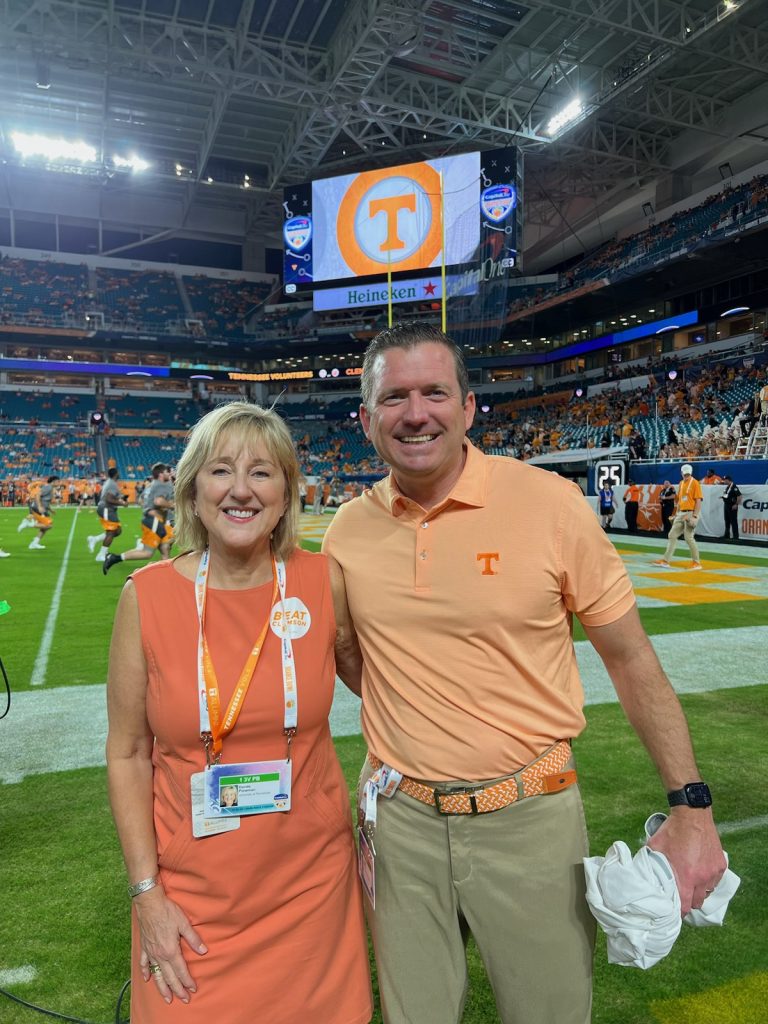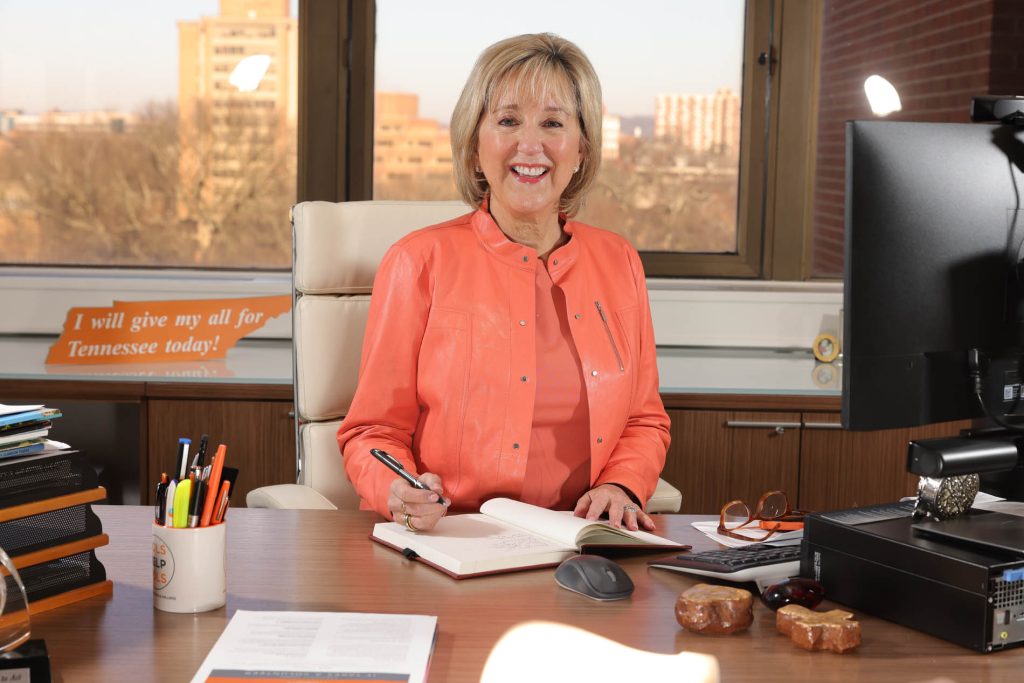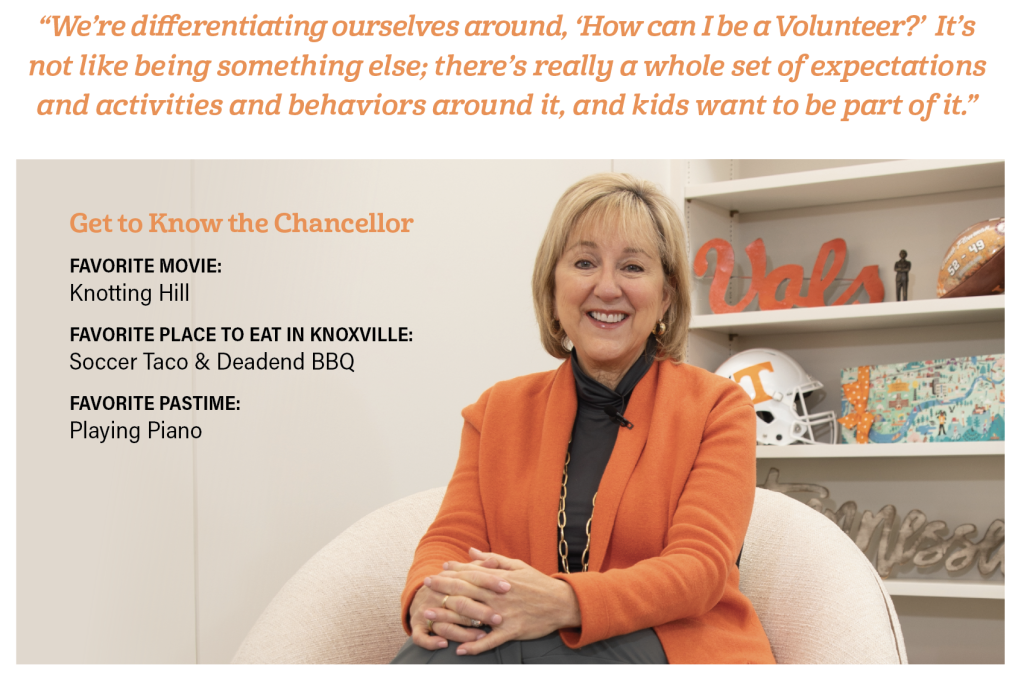Donde Plowman joined the University of Tennessee Knoxville in 2019 with big plans, and nothing’s going to stand in her way of achieving them—innovative initiatives, exceptional sport teams, and unbridled growth abound.
Over the last year, Cityview has been following the University of Tennessee athletic teams closely as they broke records and excelled in team pursuits. We’ve watched coaches make an enormous difference in the lives of their student-athletes. We watched former non-sports fans engage in UT athletics and become that much more excited to cheer “Go Vols!” We’ve watched new programs come to the university, new buildings in the process of being built, and a momentum here that the university is ready to take the next step. To top it off, Forbes Magazine recently ranked UT as one of the top large employers for the second year in a row.
At the top of all of this local change is Chancellor Donde Plowman, a former Haslam Business School dean with a love of the cuisine at Soccer Taco and Dead End Barbecue, playing piano, and of course, all things UT. I sat down recently with the chancellor at her office to discuss the growth the university has seen since her return to UT in 2019.
Talk about the momentum you’re seeing at the university. Are there certain areas that seem to be moving more quickly than others?
“Everything’s moving. Athletics is moving really quickly, as I know you know. Some areas have been moving anyway, but weren’t really getting as much attention. All through this football season, I talked about how we’re in the top five in football, or we’re No. 1 in football, or we’re top 10, we’re six, but we’ve been in the top five in nuclear engineering for a long time. We’re in the top three in supply chain management. We’re number one in polymer science.
So we’re just starting to really tell our story better in a more coherent way. I tell people all the time, I think athletics started it, but we’re the everything school. We have more applications coming in than just about any university in the country. So we’re on the rise.”
Are these changes in athletics a result of the introduction of Danny White as Vice Chancellor and Director of Athletics?
“I think Danny White has had a huge impact, and here’s why. When I was recruiting Danny, I said to him, ‘I need someone to come help me build this university. We’ve got to build this athletic department.’ And he’s a builder. That was an attractive challenge for him.
“He has created this culture of excellence and winning. He hasn’t hired many coaches since he’s been here. He hired Josh who then hired his whole staff. But the coaches were here, and they’re wonderful, strong coaches. But it’s just like you were speaking about before: positivity is sort of contagious. And they’re working as an entire culture over there, I think, in ways that haven’t happened in a long time.
“He’s built a team around him. We’re doing things at a different scale, a different kind of aspiration level, and it’s contagious. So I give him a lot of credit. The coaches obviously, get the credit for really working with the players, but creating an environment where people feel like they’re part of something that’s really important? I think Danny’s done a lot with that.”

You were in Miami for the Orange Bowl. What was it like to be there celebrating the success of the football program?
“First of all, the Orange Bowl Committee puts on a great show…At the President’s dinner, I sat next to Jim Clements, the president at Clemson. I’d never met him, but I’ve admired his leadership….He and I co-authored an op-ed that appeared in the Miami Herald the day before the game, jokingly saying, ‘Okay, we don’t agree on the colors of orange or who should win this game, but we do agree on the land-grant mission and access to higher education.’
“I think it brought together everything about what we’re doing to watch those players. At the end of that game, I was down there on the field and they were just so happy. When you watch them as players, they’re these big men out there, doing tough stuff. But after the game, they kind of reminded me of my boys growing up. They’re still kids. That was a fun night.”
I’ve heard that one of your favorite sayings is “Success begets success.”
“One of the things I’ve watched in athletics in an interesting way is the momentum that started building, and I think it started with baseball as we were just coming out of COVID. We ended up going to Omaha, and people started celebrating baseball who never attended any games. The next fall, Josh’s team surprises everyone, our men’s basketball team is at the SEC championship, our women go really far in the post-season play. And it’s just this momentum, and I see it in athletics.
“I think it’s a perfect example of what you’re talking about. In the other areas of the campus, the main business of what we do is attracting students. We have it here. We have the best tour guides in the country. We’ve stood up an incredible program around student success, which wasn’t here before; it was a university initiative. And so some students are excited to come here, the word gets around, and it just keeps growing.
Where do you envision the biggest strides will be at the university over the next few years?
“Where I hope the biggest strides are is that we become known, truly, as the everything school. So that when people think about Tennessee, we’re one of the few schools that is an example of, ‘Yes, they’re strong in athletics, but my goodness academically, everyone wants to go there. Faculty want to come take jobs.’ That’s how I’m thinking about it that we will be truly everything student.”
Are there traditions you still see compared to when you joined UT as a member of the Haslam School of Business faculty?
“One of the things I was introduced to as a faculty member was the Vol Walk. One of the things about Tennessee is that we are rich in tradition, and in other schools, that’s not always true. And so it gives us so much to build in.
“What does it mean to be a volunteer is something we’ve really drilled down on. And part of our new strategic vision is the true ‘volunteer experience.’ And what is that like? We’re starting to get that map down where all of our students take the Lifted Strengths, they know what their top five strengths are.
“We’re differentiating ourselves around, ‘How can I be a Volunteer?’ It’s not like being something else; there’s really a whole set of expectations and activities and behaviors around it, and kids want to be part of it. So that’s just an example. What does it mean to be a volunteer.
“The torchbearer, everyone walks by that several times a day. We talk a lot about lighting the way for others; that’s what volunteers do. I feel fortunate to be in a place that’s not having to think of new traditions. We’re really giving a lot of energy into existing ones.”

UT reported a 15 percent increase in freshman at the university this past year. Where are you going to put them all?
“First of all, we sadly won’t be able to admit all of them right now. We’re in the process of building three new dorms. You don’t see any shovels yet, but we just got approval to try to enlist third party developers. So that’s underway. We’ve always emphasized freshman housing.
“We’ve required freshmen housing in the past. But by the time the kids get to be sophomores, they usually want to move on. However, our new dorms are really nice and so there’s increased demand to stay in the dorms as sophomores. It’s been a complex problem that we’re eagerly solving.”
And for three years, you’ve been able to hold tuition rates, with no increases. How long are you anticipating that will last?
“I’m very committed to access to education. College is expensive, and it’s gotten expensive for a lot of reasons. When we have real costs that go up, we have to respond to it. It’s more expensive to provide meals. So we’ve had to have a little bit incremental cost here, improvement there. But we’re going to hold the line on tuition, as I’m committed to that as long as we can. When you grow your enrollments, you have more tuition dollars to help you do the things that you want to do, and so that’s the strategy for right now. I don’t want this place to be the most expensive public school in the country. We’re going to keep working at that.”
UTK’s Innovation Institute came to life not long after you started. How do you foresee its role in innovation playing out in the coming decade?
“That one was actually dreamed up and conceptualized before I got here, and in the summer of 2019, that was passed by the board. The whole idea of that is to have a more coordinated effort between this campus and Oak Ridge National Lab. We have lots of individual faculty who forever have been doing lots of research out there. In fact, we’re ranked number six in the country on dollars from DOE to support our research. But now we’re going to have a much more systematic effort between the two institutions so it’s not just dependent on one professor, one researcher.
“What that’s going to enable us to do is go after bigger contracts, go after contracts from other sources other than DOE, and really strengthen and grow new relationships with the lab. I’d like it to be the case, that when people think of University of Tennessee, they think, ‘Oh my gosh, it’s right near Oak Ridge,’ or they think about Oak Ridge and they think, ‘Oh, the University of Tennessee.’ That’s my goal in the academic world out there and in the world of national labs. It’s a great opportunity for us.”
Even with all the good, do you have any concerns about any aspect of the university’s future?
“My greatest concern is not so much about UT, but about higher ed in general, and we’re part of that. We’ve got to change the way we think about how we do things and about what is a university. For the first time in my life, in the last few years, people in the country have begun to question the value of a college degree. I think we have to do a better job because it still has a lot of value. Your life is better in so many ways with a degree versus without. But we’ve got to tell that story better.
“We’ve got to make sure we’re delivering on the promise that a college degree is going to make your lives better. Yes, you’ll earn more money. You’re more likely to be engaged in civic activities, you’re likely to have health insurance, you’re likely to be healthier, you’re likely to be more philanthropic.
“There’s a lot of things we know. But what worries me is we in higher ed haven’t really told our story that well. So there are moms and dads out there that go, ‘Wow. I don’t really know.’ College has got to be an option for everyone. Not just people whose families are well-equipped to financially support that.”
I’ve generally seen a movement away from what I would call, ‘common sense curriculum.’ How is UT combating this and preparing students for the real world?
“All of our students now take the StrengthsFinder assessment. I’ve taken it and my whole cabinet has, too. My top five strengths are strategic, achiever, positivity, futuristic, and accessible. I know what my strengths are, and I try to leverage them to be more successful in this world. And that’s what we’re trying to help our students do. So you may choose to be an accounting major, but those who have relatable as a skill, that means you’re really good with people. So how are you going to use that to go do great things in the world? And I think that’s appealing to students.
“I’m teaching classes this semester, we just had our first class yesterday; I’m co-teaching with Governor Haslam. We spent a good part of the first three hours talking about his strengths, my strengths, how you use your strengths to make a difference in your job when you get out of here, with your family, and make a difference right now in college. So I guess I don’t prescribe to the notion that we don’t have common sense. I think we need to help students figure out how to succeed and thrive regardless of what they decide to sell.”

And what does it mean to be a good leader in this day and age?
“I think Danny’s got it. I think my team has it. I think a real simple definition of leadership is the willingness to act. Just don’t talk about it, step up for it. And I say to students all the time, sometimes that means being nice to a friend. Sometimes it just means asking the question. So act, and let’s get things moving. I’ve got leaders with me, who are really great at that. And I’m just trying to generate that idea on campus.
“I started a new program called the Chancellor’s Leadership Academy, just this year. Once a month, I spend the best part of a day with 32 leaders that got nominated by their Deans. They’re not people necessarily in a leadership role, but they could be a leader. And we spend six hours together once a month talking about leadership, and what does it mean for department leader, for the director of admissions or, you know, the director of facilities? All those people in one room, we’re trying to create a culture and be leaders who can act. We’ve got a great culture here, and my job is to really define it and keep lifting up, ‘this is who we’re trying to be,’ and celebrate our people.”
Do you see this starting even further up in the University of Tennessee chain?
“People talk to me all the time about how happy they are about the partnership that I have with Randy Boyd, president of the university system. Randy hired me, and from day one, from the moment I met him, there just felt like a chemistry. Maybe it’s because I was a dean of a business school and he’s a successful entrepreneur, but people tell me all over the state, ‘We are so grateful for you and Randy and the fact that you all work together so well,’ and I feel that’s a blessing for the university and the state. And so I couldn’t be more excited for him to be president of the university and the fact that we get to work together.
We work at it, we work at trying to make it public how well we get along. We don’t necessarily always agree on every single thing, but we talk things through and we always arrive at what seems like the right thing to do. So I’m grateful for his leadership.”
What’s your greatest achievement at the university thus far?
“I think my greatest accomplishment has been creating a sense that the chancellor is accessible and cares about students. And I think that’s part of the sort of contagion that’s going on. Our deans are the same way. It sort of just permeates. The governor asked students in class yesterday, ‘All you out of state students, why did you come?’ And some of them are saying one thing after another, but several of them said, ‘Because Tennessee just seems to care more.’ I loved hearing that. Now that’s not because of anything I’ve done, but they get a sense that we want them. And I want that to be true.
“I want to be the university where everyone can see them themselves being successful here, not just someone who was the valedictorian of your high school, or not just someone who won that science contest or was the best athlete. There’s a place for everybody. So I think the fact that enrollments are up, students are saying it feels like a caring place, I think that’s saying something.”

Comments are closed.